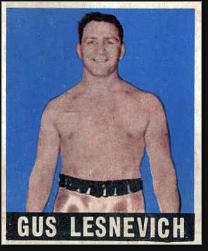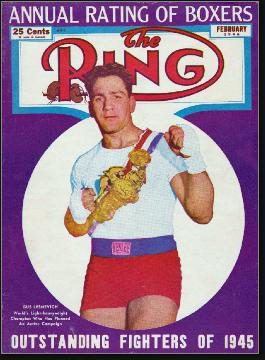
Sport: Boxing
Born: February 22, 1915
Died: February 28, 1964
Town: Cliffside Park, New Jersey
Park, NJ. Powerfully built and well-coordinated, he focused on boxing as a young teenager during the early years of the Depression. He fought as an amateur in Bergen and Hudson counties and, at 5’9” and 160 pounds, he entered and won the 1933 New York Golden Gloves as a Middleweight.
Gus turned pro at the age of 19. Competing mainly in Brooklyn, and later in Los Angeles, Gus lost just one of his first 32 fights. In 1937, Gus began drawing better fighters. His reputation as a tough-as-nails battler earned him a legion of fans willing to pay their way to see him fight. In 1939, Gus earned his first crack at a major title when he faced Light Heavyweight champ Billy Conn in Madison Square Garden. Unlike Gus, Conn was quick on his feet. That proved the difference in a 15-round decision that went Conn’s way.
In a rematch in Detroit seven months later, Conn defeated Gus again in 15 rounds. Conn promptly moved up to the heavyweight class to face Joe Louis in the famous “He can run, but he can’t hide” fight. Gus won 7 of his next 8 fights, including a victory in Madison Square Garden over Tami Mauriello, who held the Light Heavyweight title.

In 1943, Gus joined the war effort when he enlisted in the Coast Guard. He served until the end of the war. Like many athletes who spent their prime years in the military, Gus lost his edge. He split his first four postwar bouts—including the only time in his career he was knocked out—leading sportswriters to predict he would retire. However, Gus won five straight fights in 1947 and 1948, reclaiming the world Light Heavyweight title with a first-round KO of Billy Fox—and earning accolades as The Ring 1947 Fighter of the Year. Among the highlights of this run was a first-round knockout of Melio Bettina, who was being groomed for a shot at Joe Louis’s Heavyweight title.
Unfortunately, the Light Heavyweight crown did not rest atop Gus’s head very long. Freddie Mills outpointed him in London four months later. In Gus’s next fight, he knocked out Eldridge Eatman in 21 seconds at the Mosque Theater in Newark (now Symphony Hall). However, at age 34, Gus had little left in the tank. He faced Joey Maxim for the vacant U.S. Light Heavyweight title in Cincinnati and dropped a 15-round decision.
Gus’s final ring appearance came on August 10, 1949 in Yankee Stadium, against Ezzard Charles. After seven brutal rounds, Gus’s corner refused to send him out for the 8th. He retied with a record of 60–14–5.
Gus continued to live and work in Bergen County, and put his fame to work in sales and PR for Arrow Carrier, a trucking company in Carlstadt. He also refereed fights in New Jersey and New York. In 1953, Gus’s wife, Georgianna, left him. He was granted a divorce and custody of their four kids. Gus remarried six months later. On February 28, 1964, Gus complained of stomach pains. His wife drove him to the doctor’s office, where he died of a heart attack at the age of 49.